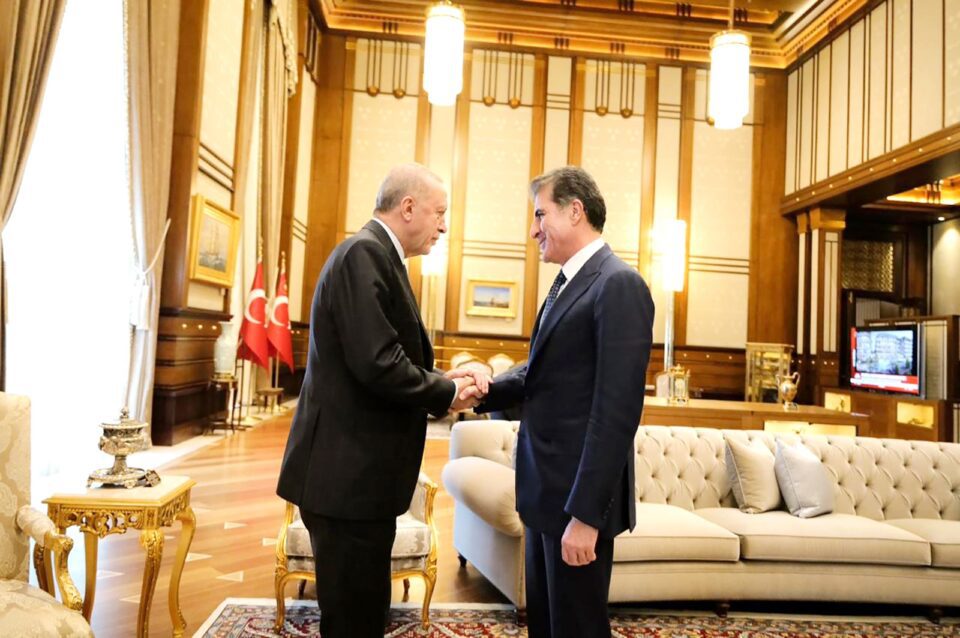Kurdistan Region President Nechirvan Barzani’s Diplomatic Visit to Turkey:
The President of the Kurdistan Region Nechirvan Barzani traveled to Ankara last week where he engaged in discussions with Turkey’s Foreign Minister Hakan Fidan, the Head of the National Intelligence Organization (MIT) İbrahim Kalın, and President Recep Tayyip Erdoğan.
Barzani’s visit was particularly significant, as it coincided with critical discussions surrounding bilateral relations between Ankara and Erbil, as well as pressing regional security and energy matters. Notably, this official visit occurred amidst emerging indications in Turkey regarding a potential resolution process for the Kurdish issue, and just four days prior to the parliamentary elections in Northern Iraq, which had been delayed for two years.
Following the meeting between Erdoğan and Barzani, the Directorate of Communications released a statement indicating that the leaders addressed Turkey-Iraq relations, the cooperation between Ankara and Erbil, and assessed both regional and global developments.
President Erdoğan articulated his desire for the parliamentary elections scheduled for Sunday in the Kurdistan Region to occur in a climate of peace and inclusivity.
Erdoğan Emphasizes Turkey’s Dedication to Regional Stability
Erdoğan highlighted Turkey’s commitment to the stability and security of the broader region and commended the Iraqi authorities for their efforts to maintain peace within the country. Additionally, Erdoğan remarked that the Development Road Project is poised to benefit not only the KRG but the entire region, emphasizing the necessity of sustained cooperation to decisively eradicate the terrorist threat.
Turkey considers the stability and peace of Iraq to be vital for the future of the region and seeks to enhance its relations with Baghdad in this context. With a strong partnership with Erbil, Turkey aims to deepen cooperation across the security, economy, and energy sectors, while also prioritizing the resolution of issues between the federal and regional governments in Iraq.
It is believed that these matters were thoroughly examined during the discussions between Erdoğan and Barzani, including potential future actions.
Security emerged as a key topic of discussion. The security issue was highlighted as a primary agenda item during the talks held in Ankara. Both Turkey and Iraq reported significant progress in their collaborative efforts against terrorism over the past year and agreed to jointly address the presence of militant elements in northern Iraq.
Ankara and Baghdad have jointly declared their intention to establish a military coordination center in Baghdad, designating the Bashiqa base, which has been under the control of the Turkish Armed Forces (TSK) for several years, as a shared training facility. This decision emerged during President Erdoğan’s visit to Baghdad in April.
Additionally, a significant development in the security partnership between Iraq and Turkey is the advancement of the Development Road Project, which is vital for international transportation. This ambitious 1,200-kilometer initiative aims to create a railway link between the Greater Fav Port in the Persian Gulf and Turkey’s southern border.
The Development Road Project is designed to establish a connection between Iraq and Turkey, facilitating transportation from the Gulf to Basra via maritime routes, and subsequently linking to Turkey and Europe through road and rail networks. This initiative is expected to create a significant global trade corridor. The successful implementation of this project is deemed crucial for the economic advancement of Northern Iraq including its Kurdistan Region, enhancing its strategic significance even more.
Photo: Kurdistan Region President Nechirvan Barzani meets with Turkey’s President Recep Tayyip Erdoğan in Ankara, October 16.

